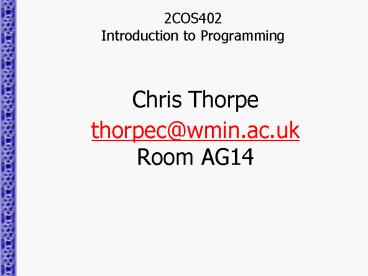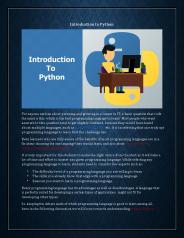2COS402 Introduction to Programming - PowerPoint PPT Presentation
1 / 29
Title:
2COS402 Introduction to Programming
Description:
The bookshop has lots of copies. Where to get the BOOK. The University Bookshop is located at the Marylebone Campus ... Internet/Library/Bookshops ... – PowerPoint PPT presentation
Number of Views:56
Avg rating:3.0/5.0
Title: 2COS402 Introduction to Programming
1
2COS402 Introduction to Programming
- Chris Thorpe
- thorpec_at_wmin.ac.uk
- Room AG14
2
Today
- Briefing on what you will be doing this year
- Learning Resources
- KEY questions answered
- Overview of what programming is
- Guidance on what to do next
3
The Module
- Module codeCOS402
- Starts September finished May 2008
- Worth 30 credits (double)!
- CORE module
4
Learning Resources
- Yourselves!
- Course book
- Blackboard (All lectures like this and homework
is published) - Tutors
- Each other
- Library/Other Books
- Internet
5
Learning Resources
- YOURSELVES!
- The MOST important resource!
- YOU will have to take responsibility for learning
to program by doing it. IT CAN NOT BE CRAMMED!
6
Learning Resources
- Yourselves
- You cannot learn to program by reading a book
it is more like learning to play a musical
instrument! - This is a double module worth 30 credits it is a
core module. We estimate that You should put in
at least 250-300 hours over the year including
class contact time. Thats 9 hours a week. You
have 4 hours contact (lectures and tutorials)
that leaves 5 hours a week for pre-tutorial
reading and any catching up of lab work not
completed. - We expect you to keep up. Please do not complain
that I set too much work for the labs, because as
you have seen you have plenty of time outside
labs to finish the set work!
7
Learning resources
- Course Book You MUST get a copy
- Programming and Problem Solving with C by Nell
Dale 4th Edition - ISBN 07637 0798-8
- I will simply refer to this as Dale. E.g. do
exercises 2-4 on page 1001 in Dale. - There is also a version available that includes a
student edition of Visual C.NET Program
development studio. - The bookshop has lots of copies
8
Where to get the BOOK
- The University Bookshop is located at the
Marylebone Campus - They have done a good deal with the publishers to
supply the book with the tools you will be using.
9
Learning resources
- Course Book
- Pre-tutorial reading and exercises and Tutorial
work will be set from this book. I will refer to
set question numbers - I will NOT be handing any notes out. There are
far too many of you!
10
Learning resources
- Blackboard
- learning.wmin.ac.uk
- It contains lecture notes (these PowerPoints,
Demo programs, pre-tutorial and tutorial work
specifications.) - It contains assessment guidelines, past papers
etc. - Available outside the university! E.g. At home!
- Show them Chris!
11
Learning Resources
- Blackboard
- Vital to visit ASAP
- All fully registered students should have access.
- If you are registered and cant access go to the
library and ask what the problem is. - If you are not registered fully yet make sure you
do get registered ASAP. You will have to use my
backup site to get homework specs and notes.
12
Backup site for course material
- If you have problems accessing blackboard because
of registration issues I will dump the necessary
course material on my old website. - Note I will stop doing this after a few weeks
- http//users.wmin.ac.uk/thorpec
13
Learning Resources
- Tutors
- Tutors are there to get you out of holes, and
give one to one advice on techniques. - Suggest approaches to problems NOT solve
problems for you. - Tutors are there to answer any questions on
written pre-lab and lab-exercises. - Tutors should not have to lecture.
14
Learning Resources
- Each other
- Talk to your fellow students, find out which
students understand the material you have
problems with and ask them nicely to explain it
to you. - If you think you understand something then
explain it to others (It is the best way I know
of proving understanding) - In labs discuss things with each other.
15
Learning Resources
- Internet/Library/Bookshops
- There is a VAST amount of material out there
catering for complete beginners to the most
advanced professional. - It is always helpful to get alternative views on
tricky subjects.
16
The frequently asked questions (FAQs)Why,
What, How, Where and When
- For example
- Why are you learning to program?
- What will you learn?
- How will you be assessed?
- Where will you learn?
- When will you learn?
17
Why are you learning to Program? Or whats in it
for me?
- For pure academic interest (I wish!)
- To get a job and pay off your loans!
- You are all doing computer science do you really
think you can avoid it! - Because it underpins virtually all your other
subjects. You will develop problem solving skills
and organisation skills.
18
What is computer programming?
- Specifying a precise set of instructions in a
particular order in order to get the computer to
carry out a task - Than means solving the problem first. Deciding on
the sequence of instructions needed. - Converting the instructions into your programming
language
19
What programming language will you learn?
- C. Why C?
- It enables us to teach both procedural and Object
Oriented Programming. - These are the two most dominant approached used
today. - Writing Programs where we FOCUS on the processes
- Or Programming focusing on the DATA.
20
Practice, Practice, Practice
- There is no magic formula to building a computer
program. - Computer programming is more like
- Learning a musical instrument
- Learning to play a new sport
- It is an imaginative process
- It is an active process
- It is an incremental process
- It constantly builds from previously learnt ideas
- Do NOT get left behind it is VERY hard to catch
up!
21
What will you learn?
- You will learn a new vocabulary, the language of
this subject. - You will learn how to begin the process of
problem solving and designing a solution. - You will learn how to write the solution to a
problem down in an unambiguous way. - You will learn how to verify if the solution is
correct.
22
What you will learn?
- You will learn the fundamental concepts and
application of procedural programming sequences,
selection, repetition, functional organisation. - You will learn fundamental concepts and
application of data structures - You will learn fundamental concepts and
application of Object oriented programming
23
Assessment
- Three Components
- Practical work semester 1 (35)
- Practical work semester 2 (25)
- Formal Exam in May/June (40)
- THERE IS A MINIMUM mark for each component of
25 - This means if your overall mark is more than the
pass mark of 40 but if any one of the above has
less than 25 you do NOT pass
24
Practical Work
- Comprises of in labs tests and evidence of
commitment to learn - There will be a short test at the end of you
tutorials in teaching weeks, 3, 6, 9 - There will be a longer test in week 12.
- Check blackboard web site for how much each of
these is worth.
25
Practical Work
- Commitment to learn marks
- Your tutors will give you an mark for what you
have done in a tutorial. This mark is affected by
your pre-tutorial work. This will be worth (5
per semester). - You will have to show your pre-lab exercises and
specified lab exercises. - It is your responsibility to sign in each week
and to make sure you have been graded. The tutors
mark sheet is the ONLY evidence of your work that
will be accepted.
26
End of Year Exam
- At the end of the academic year in May 2008 each
semester there will be a formal exam that aims to
assess your understanding of the more theoretical
parts of the course. This is worth (40)
27
Where and When
- You come to lectures here at your allocated time.
Lectures are VERY important. It is not like
school where I have to teach to a set syllabus. I
set the syllabus! - You will have been allocated tutorial groups.
Timetable gives location and times for tutorial
groups. - You must stick to your tutorial groups, we cannot
accept floating from one group to another. - Labs this week will run, where you should make
sure you can log on to the system. Visit
blackboard or my website and check your
pre-tutorial and tutorial work. E.g. this week
You should go through the introduction to C I
have prepared. - Student guide Your tutor will hand out an
overview of the key information for the module
during your tutorial.
28
To Do List!
- You need to purchase the course book
- In your labs this week confirm your account
details (username is your student ID and password
is your date of birth, see your information
sheet) - In the lab this week, visit Blackboard go to the
tutorial specs page and do pre-lab reading and
exercises for next week. - Brush up on you basic windows skills, learn to
- rename files
- create folders and subfolders
- copy move files to and from hard disk and
floppy disk - delete files and folders
29
Try to have fun!
- Bye Bye































